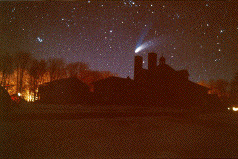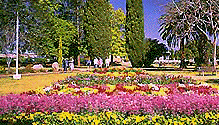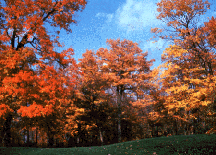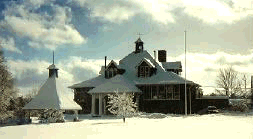 |
Word LoreOrigins of Words from the Threads of Inquiry |
 |
Word LoreOrigins of Words from the Threads of Inquiry |
What language are we speaking? It is English. Why is it called that? It is the language which is spoken by English people who live in England. Even though we are not English, our language is still called English because it is very similar to the language that English people speak in England.
In fact, American English is slightly different from British English. Hundreds of years ago, the first English speaking people came to America from England. Since that time, the English language has been spoken both in America and in England, but it has changed just a little bit--and in different ways--in both countries. Now there is enough of a difference between the languages spoken in America and England that sometimes people call the English spoken in American American English and the English spoken in England British English.
Over long periods of time, the language a people speaks changes very slowly. Usually, these changes take place so gradually that the people speaking the language probably won't notice the changes. But after hundreds of years, the changes become apparent--just has they have with British English and American English. Eventually a language can change so much that it can't really be called the same language anymore. Perhaps one day American English will be so different from British English that we won't call the language spoken in America "English" anymore.
Even before there was a special kind of English spoken in America, the English language in England had been slowly changing for a very long time indeed--over a thousand years! If we had a time machine that would allow us to meet and talk with people who lived in England six hundred (600) years ago, we might have a lot of trouble understanding them. Today we call their kind of English Middle English. If we used our time machine and went back to talk to people who spoke English one thousand (1000) years ago years ago, their English would be so much different from ours that we could hardly understand them at all. We call their kind of English Old English, and you can listen to what it might have sounded like here. Before that time, the language was so different that we don't even call it English.
Any language can change so much that it needs a new name. Sometimes a language will change differently in different places, and it will need two or more new names. It is possible to draw a picture like a family tree showing how languages change. This link shows a tree with the English language on it. This language family tree shows the Germanic languages. About two thousand (2000) years ago there was a language we call Germanic. It was spoken a little differently in different places, and slowly turned into a number of different languages, including English. Just as English is descended from Germanic, Germanic is descended from another language we call Indo-European. Indo-European was spoken perhaps six thousand (6000) years ago, and here is another language family tree showing it. Germanic and English are both shown on this family tree diagram.
We can learn many different things by looking at how a language changes. Below are a number of terms and vocabulary words taken from the Threads of Inquiry, each of which has a brief discussion about its history and the folklore associated with it. By introducing such concepts, we find that the subjects we investigate are all interconnected.
Unlike modern English, most languages (including Old and Middle English) have few or no "silent letters". Thus the Norwegian word time is not pronounced at all like the English word "time"--the Norwegian word is pronounced something like "TEE-meh".
The letter i is usually pronounced "ih", although in the North Germanic languages í and i are often pronounced "ee". In general, e is pronounced "eh" in most of the sample languages, and a is pronounced generally closer to as in English "father" while o is pronounced generally closer to as in English "box"--though "long o" (ó or ô) is pronounced as in English "note". On the other hand, "o umlaut" (ö) and "slashed o" (ø) are pronounced like the "ea" sound in English "earn". The letter y is often pronounced with one's mouth in position to say "oo" (as in "boot"), but then trying to make an "ee" sound without changing the position of one's lips (similar to German ü).
Some letters or letter combinations have special sounds. The ch sound as in Scottish "loch" or the name of the composer "Bach" is represented by the following letter combinations:
In Old English, sc was pronounced like modern English "sh"--Dutch and German sch are pronounced the same way. In every Germanic language except English, j is pronounced like the consonant "y" in "yellow" "(except in Dutch ij which sounds like "ee"). In High German, s is pronounced like English "z", and w like English "v", while High German ei sounds like the English word "eye". Italian ce and Spanish che sound something like "chay".

"Sun" is a very old word. This is because people have always needed a word to describe that big, fiery thing that appears to move across the sky.
People who spoke Indo-European six thousand (6000) years ago might have used a couple of different words for "Sun". Even then, language had changed enough in different places where Indo-European was spoken that we can't find just one word for "Sun"! Some people might have said something like "suen", while other people said something like "sáwel". Both these words start with similar sounds (su-/saw-), but have very different endings (-n or -l).
Both these words for sun were still used in Germanic, about two thousand years ago. People who spoke Germanic might have said something like "sunnón" or "suól". English (and other West Germanic languages) are descended from the language used by Germanic-speaking people who said "sunnón". One thousand (1000) years ago, the people who spoke Old English said "sunne". Other Germanic languages descended from those used by Germanic speakers who said "sunnón" (mostly West Germanic languages) have words for "Sun" which look a lot like the English word "Sun":
Languages descended from those used by Indo-European speakers who said "sáwel" (and from Germanic speakers who said "suól" (mostly North Germanic languages) have words for "Sun" which look like these:Today we usually think of the sun as an "it". Sometimes people might refer to the sun as if it were a person, and often they will speak of it as if it were male (as in, "The sun is shining, and his rays are very warm."). However, people thought of the Sun as "she" for a very long time--up until the 1500s, about five hundred years ago.
 Look at the words "shade" and "shadow". What do you notice about them? One thing students might notice is that they start with the same letters: shad-. They might also notice they have similar meanings: casting a shadow makes shade. If they think these words are related, they are right!
Look at the words "shade" and "shadow". What do you notice about them? One thing students might notice is that they start with the same letters: shad-. They might also notice they have similar meanings: casting a shadow makes shade. If they think these words are related, they are right!
A thousand (1000) years ago, people who spoke Old English said "sceadu". This word basically meant "shade". Six hundred (600) years ago the people who spoke Middle English used the word "schade" which eventually turned into our word "shade".
There were other forms of Old English "sceadu", though, including the oblique case form "sceadwe". 1 This eventually turned into our word "shadow". Since both "shade" and "shadow" come from one word (Old English "sceadu"), their meanings are very, very similar. In fact, you can try making sentences using only one of the words, and then try substituting in the other to see if the sentence still makes sense. Most of the time it will make sense, although it might sometimes sound a little funny. People tend to use "shade" and "shadow" slightly differently even though they mean almost the same thing. See if the students can figure out how they use both words.
About two thousand (2000) years ago, people who spoke Germanic might have said "skaðwoz" or "skadwaz" to mean "shade" (or "shadow"). 2 About six thousand (6000) years ago people who spoke Indo-European might have said "skotwós" or "skotos". This turned into words with related meanings in different later languages; the Greek word for "darkness" is very similar: "skotos". Here are words meaning "shade" or "shadow" in other Germanic languages--most only have one word for "shade" and "shadow":
 What in the world does the word "world" mean? In these Threads we mostly use it to refer to the planet Earth, which we live on. But sometimes we can use the word world with slightly different meanings. We might use it to refer not only to the planet Earth, but to include the people who live on it, or the plants and animals who live on it, or even inanimate things like lakes, rivers, and oceans.
The word "world" exists only in the Germanic languages. The reason for this is that is actually the combination of two words. The first part of the word is "wer-", from Germanic "weraz" or "wiraz" which means "man"--this same element gives us the "were-" in "werewolf", which means "man-wolf". The second part of the word was from "alda", which means "old" or "age". So, when put together in Germanic, as it might have been used two thousand (2000) years ago, "werald" means "the age (or life) or man". Eventually the word came to mean "things that have to do with humanity" and the original meaning began to become less important. Later, it eventually came to refer to the planet Earth and everything in it.
People who spoke Old English one thousand (1000) years ago might have said "weorold" or "worold". Here is how the old Germanic word "werald" turned out in other Germanic languages:
What in the world does the word "world" mean? In these Threads we mostly use it to refer to the planet Earth, which we live on. But sometimes we can use the word world with slightly different meanings. We might use it to refer not only to the planet Earth, but to include the people who live on it, or the plants and animals who live on it, or even inanimate things like lakes, rivers, and oceans.
The word "world" exists only in the Germanic languages. The reason for this is that is actually the combination of two words. The first part of the word is "wer-", from Germanic "weraz" or "wiraz" which means "man"--this same element gives us the "were-" in "werewolf", which means "man-wolf". The second part of the word was from "alda", which means "old" or "age". So, when put together in Germanic, as it might have been used two thousand (2000) years ago, "werald" means "the age (or life) or man". Eventually the word came to mean "things that have to do with humanity" and the original meaning began to become less important. Later, it eventually came to refer to the planet Earth and everything in it.
People who spoke Old English one thousand (1000) years ago might have said "weorold" or "worold". Here is how the old Germanic word "werald" turned out in other Germanic languages:
 Where on Earth does the word "earth" come from? "Earth" is another word which is found almost exclusively in the Germanic languages. Probably people speaking Germanic about two thousand (2000) years ago said something like "erþó" or "erþâ".
3
This word already meant "earth" even then, and no one has any certain ideas what the word might have been like earlier or what it meant. About one thousand (1000) years ago people speaking Old English might have said "eorðe".
Where on Earth does the word "earth" come from? "Earth" is another word which is found almost exclusively in the Germanic languages. Probably people speaking Germanic about two thousand (2000) years ago said something like "erþó" or "erþâ".
3
This word already meant "earth" even then, and no one has any certain ideas what the word might have been like earlier or what it meant. About one thousand (1000) years ago people speaking Old English might have said "eorðe".
The word "earth" can be used to mean a number of different things. It can simply mean "dirt". This may have been one of the earliest meanings. What do we stand on? If you are inside you are probably standing on a floor, but if you are standing outside you are often standing on dirt. Perhaps, people came to think of the whole area they were standing on as "dirt" or "earth". By the time people were speaking Old English, about one thousand (1000) years ago, "earth" could already mean the world on which people live. It took longer for "earth" to come to mean "Planet Earth"--until around 1400 CE or so. Here is how the old Germanic word ""erþó"" turned out in other Germanic languages:
 "Light" is another word common to all the Germanic languages. About six thousand years (6000) ago, people who spoke Indo-European all used words having to do with shining or being white-colored that began with the sound "leuk-", although in different areas they may have used different endings for the word--already at that time the word was changing! People speaking Germanic about two thousand (2000) years ago probably said something either like "leuktom" or "leuksa" which meant "light". People speaking West Germanic used "leuktom", and by about one thousand (1000) years ago, people speaking Old English had changed this word to "léoht". This word slowly changed to "leht", then "liht", and finally to Middle English "light", which was spelled the same way as our word "light". Here is how "leuktom" turned out in other West Germanic languages:
"Light" is another word common to all the Germanic languages. About six thousand years (6000) ago, people who spoke Indo-European all used words having to do with shining or being white-colored that began with the sound "leuk-", although in different areas they may have used different endings for the word--already at that time the word was changing! People speaking Germanic about two thousand (2000) years ago probably said something either like "leuktom" or "leuksa" which meant "light". People speaking West Germanic used "leuktom", and by about one thousand (1000) years ago, people speaking Old English had changed this word to "léoht". This word slowly changed to "leht", then "liht", and finally to Middle English "light", which was spelled the same way as our word "light". Here is how "leuktom" turned out in other West Germanic languages:
 "Dark" is a strange and rare word for such a common concept. Everyone needs a word to describe the absence of light, but there are a number of different words in the Indo-European languages to describe this concept! Sometimes people make special words to describe concepts which are frightening or disturbing. Perhaps some students will admit to being afraid of the dark--such feelings may have been quite common long ago, before electric lighting allowed us to reduce the amount of dark so easily.
4
"Dark" is a strange and rare word for such a common concept. Everyone needs a word to describe the absence of light, but there are a number of different words in the Indo-European languages to describe this concept! Sometimes people make special words to describe concepts which are frightening or disturbing. Perhaps some students will admit to being afraid of the dark--such feelings may have been quite common long ago, before electric lighting allowed us to reduce the amount of dark so easily.
4
In any case, about five hundred (500) years ago people who spoke Middle English said "derk", which was changed from the word "deorc" used by speakers of Old English about one thousand (1000) years ago.
No one knows exactly where the Old English word "deorc" came from. There is a similar word found only in Old High German (which was spoken in southern Germany about one thousand years ago) "tarchanjan", meaning "to hide" or "to conceal". You can see how the start of this word, tarch-, is similar to "dark". Perhaps speakers of Old English described the absence of light as that which hid things or concealed them. It is possible that both "tarchanjan" and our word "dark" come from a West Germanic word like "darknjan" which was used two thousand (2000) years ago.
 How do we know when it is day? When the Sun is visible in the sky. This explains the origin of our word day, which seems to have come from an Indo-European form "dhegh-" or "dhegwh" which had to do with heat, burning, and times when it was warm. For example, the Sanskrit word "dah" means "to burn" and Albanian "djek" means "burnt, while Lithuanian "dagas" means "hot season".
How do we know when it is day? When the Sun is visible in the sky. This explains the origin of our word day, which seems to have come from an Indo-European form "dhegh-" or "dhegwh" which had to do with heat, burning, and times when it was warm. For example, the Sanskrit word "dah" means "to burn" and Albanian "djek" means "burnt, while Lithuanian "dagas" means "hot season".
About two thousand years (2000) ago, people speaking Germanic said "dagoz", meaning "day". People speaking Old English about one thousand (1000) years ago said "dæg". There were many different forms of this word used by speakers of Middle English about six hundred (600) years ago, including "dag", "daw" "daig", and "dai". Eventually these were simplified into our word "day". Here is how the Germanic word "dagoz" turned out in other Germanic languages:
 Compared with the word "dark", the word "night" is a surprisingly common one. Words very much like "night" appear in many Indo-European languages. Six thousand years ago, people who spoke Indo-European may have used a word like "nokt". By the time people were speaking Old English one thousand years ago, this word had only changed a little, to "neaht" or "niht". People speaking Middle English (about six hundred (600) years ago had changed the word to "nyght", which is very similar to our word "night". Here is how the Indo-European "nokt" turned out in various Germanic and non-Germanic Indo-European languages:
Compared with the word "dark", the word "night" is a surprisingly common one. Words very much like "night" appear in many Indo-European languages. Six thousand years ago, people who spoke Indo-European may have used a word like "nokt". By the time people were speaking Old English one thousand years ago, this word had only changed a little, to "neaht" or "niht". People speaking Middle English (about six hundred (600) years ago had changed the word to "nyght", which is very similar to our word "night". Here is how the Indo-European "nokt" turned out in various Germanic and non-Germanic Indo-European languages:
 What is time? It's a thing which is so basic to our existence, that it is very hard to describe well! We all know time as the thing which a clock measures the passing of, but what it is, really? Perhaps the simplest way of describing time is to call it the system of sequential relations between events. We might also call time a period of continued existence.
What is time? It's a thing which is so basic to our existence, that it is very hard to describe well! We all know time as the thing which a clock measures the passing of, but what it is, really? Perhaps the simplest way of describing time is to call it the system of sequential relations between events. We might also call time a period of continued existence.
Meanings like these have to do with dividing up a sequence of events into sections. Not surprisingly our word for "time" goes back to an ancient Indo-European form used about six thousand (6000) years ago: "dai-". By the time people were speaking Germanic, about two thousand years ago, "dai-" was being used in two Germanic words: "tídiz" (meaning "a division of time", and "tímon" (meaning something like "an appropriate time [at which to do something]").
The "tídiz" word became Old English "tíd" and our word "tide". In our modern English we usually use "tide" to mean the way the ocean rises and falls over periods of time (as in "high tide" and "low tide"). See how this meaning is linked to the concept of time? One thousand (1000) years ago, Old English had no one word for the ocean's tide--instead people referred to "flód" (flood or high tide) and "ebba" (ebb or low tide). A few centuries later, during the time people in England were speaking Middle English, northern Germany (where people then spoke Middle Low German) was an important center for sailors, shipping, and nautical technology. There was a Middle Low German word "getîde" which had acquired meanings which originally belonged to the ancient Germanic word "tímon" : "fixed time, proper time, opportunity". Middle Low German "getîde" also came to refer to times of the ocean's tides (which happened at fixed times, and were opportunities to use their power to help move a ship). This new meaning was borrowed for the regular Middle English word "tide" (meaning "time") in the early 1300s, when "tide" in English could refer to the time at which the ocean's tides took place. Within the next hundred years, by the 1430s, the English word "tide" had come to mean the tidal motions of the ocean themselves, rather than merely the times associated with these tidal motions. Middle Low German "getîde" led to modern Low German ""tîde" and Dutch "tij", both referring to the ocean's tides.
The word "tide" however, did not entirely lose all its old associations with time, even after receiving this new meaning. Even now, some old-fashioned expressions use "tide" to mean "time", like "Yuletide" or "eventide". "Tide" also survives in the slightly archaic word "tidings" (as in "glad tidings we bring") which means "news" (in the sense of "timely information"). This modern English word "tiding" (Middle English "tídung") seems to have been borrowed almost a thousand (1000) years ago from the Old Norse word "tíðendi", which meant "events". This word "tíðendi", comes originally from the ancient Germanic "tídiz" word. It is interesting to note that words related to "tiding" appear in other Germanic languages with similar meanings, such as Swedish "tidning" and High German "Zeitung", both meaning "newspaper".
Most other Germanic languages use a word that changed from "tídiz" to mean "time":

The North Germanic languages do have a word that changed from "tímon", as did our word "time". They, however, do not mean "time", but have a meaning that is related to the concept of time:
On the other hand, English speakers expanded the meaning of their word "tíma" into a general word for time. It's older sense of "appropriate time" only survives in expressions like "It is time to go," or "It is time for lunch" (meaning that it is the appropriate time to go or to have lunch). When people were speaking Middle English, about six hundred (600) years ago, they sometimes used "time" to mean "hour" (as Swedish/Danish/Norwegian do) but "time" could also sometimes mean "year". 6
 What do we call the season that follows Winter? It is Spring. Why do we call this season "Spring". Can the word "spring" have other meanings? What other meanings can the word "spring" have? It can mean "to jump" or "to leap". It can mean "a place where water comes up out of the ground" (in other words, the water springs, or jumps, out of the ground). It can mean "a bouncy piece of coiled metal" (in other words, the because of its shape and elasticity, the metal can spring, or jump, back into shape after pressure has been applied to it).
What do we call the season that follows Winter? It is Spring. Why do we call this season "Spring". Can the word "spring" have other meanings? What other meanings can the word "spring" have? It can mean "to jump" or "to leap". It can mean "a place where water comes up out of the ground" (in other words, the water springs, or jumps, out of the ground). It can mean "a bouncy piece of coiled metal" (in other words, the because of its shape and elasticity, the metal can spring, or jump, back into shape after pressure has been applied to it).
All these meanings have to do with jumping, or vigorous sudden activity of some kind. Can you guess the season following Winter is named Spring? What kind of things happen in Spring? What happens in nature? Plants begin growing quickly once the cold of winter has ended. One might say the new growing is practically springing up. And that is why we call this season Spring!
"Spring" is an old word, and appears in many Germanic languages with a meaning like "to jump" or "to run". About two thousand (2000) years ago, the basic Germanic form was "spreng-" and by about one thousand (1000) years ago, when Old English was spoken, the word had changed to "spryng" or "spring" and has not changed significantly since then! However, the word "spring" was only began to be used to name the season following Winter in the 1500s (about five hundred (500) years ago). People had been using expressions like "spring of the leaf" and "spring time of the year" to describe the new growth of this season, and it seems likely that the season name "Spring" was formed from such expressions.
So what did people call this season before they called it "Spring"? In fact, the common Old English word naming the season following winter was "lencten", "lengten" or "lenten". This word is related to our word "long", perhaps coming from a Germanic form something like "langiton" used about two thousand (2000) years ago. Possibly, the word was used for the season following Winter because this was the time when the Sun's path was noticeably higher in the sky and the time of daylight lengthened--you can see how similar the modern English word "lengthen" is to the Old English word "lengten"! This word survives in our Modern English "Lenten" or "Lent". This word is now most commonly associated with the Christian Lent holidays which take place in the Spring. Lenten originally was just the season name, however, and only began acquiring its Christian associations after the Anglo-Saxons (which is the name we give to the Germanic inhabitants of England who spoke Old English between about 600 and 1100 CE) were converted to Christianity. In fact, the earliest use of it in a Christian context is from around 1020 CE.
English is the only Germanic language in which a word related to "Lenten" has a Christian religious association. It was used as a common name for the Spring season which followed Winter in several other West Germanic languages: Middle Dutch "lentin" and Old High German "lengizin/lenzin". Middle Low German and Modern Dutch "lente" are closely related forms also.
However, the various modern Germanic languages use a wide variety of words for the season "Spring", many of which are related neither to "Spring" nor "Lenten"--for example, modern High German "Frühling" and Swedish "vår". This much variation in names for the same season is very surprising when compared to words for Summer or Winter, most of which are nearly the same in the Germanic languages. This suggests that the season we call Spring may not have been as important as Summer or Winter. In fact, some old Germanic cultures only counted two seasons in the year--Summer and Winter--and didn't count Spring or Fall at all.
 What do we call the season which follows Summer? It can have two names: "Autumn" or "Fall". Which one do the students use most often? Nowadays, the name "Fall" is probably used most often in American English, though "Autumn" is used as well. In British English, however, the word "Autumn" is used almost exclusively--British English used the word "Fall" for this season quite often, though now it is only sometimes found in some dialects of British English.
What do we call the season which follows Summer? It can have two names: "Autumn" or "Fall". Which one do the students use most often? Nowadays, the name "Fall" is probably used most often in American English, though "Autumn" is used as well. In British English, however, the word "Autumn" is used almost exclusively--British English used the word "Fall" for this season quite often, though now it is only sometimes found in some dialects of British English.
Why do you think this season might be called "Fall". What happens in the natural world during this season? The leaves on many trees die and fall to the ground. About five hundred (500) years ago, when Middle English was spoken, expressions like "fall of the leaf" and "fall of the year" were quite common, and the season name "Fall" comes from them. It is interesting to note that although Old English, spoken about one thousand (1000) years ago, had a word "fiæll" (or "fyll")--meaning "fall" as in "a falling from a height"--this word not only did not mean "the season following Summer", but did not even change into our modern English word "fall"! Instead our word comes from the Old Norse word "fall" which, like Old English "fyll", also meant "a falling from a height". However, during the period after the Scandinavians (who spoke Old Norse) settled in England (between 800 and 1100 CE) their word "fall" was borrowed into English and replaced the Old English word "fyll". There are many other Old Norse which were borrowed into English at this time. But the word "fall" only came to refer to the season "Fall" in the 1500s.
Before the 1500s, this season was often called "Harvest". In fact, the name "Harvest" was used for this season quite commonly up until the end of the 1700s, after which the word "harvest" began to apply more specifically of the gathering of crops. Before the 1700s, most English-speaking people had occupations which had to do with farming, and "Harvest" was quite an appropriate name for this season when the crops were gathered in. However, after the Industrial Revolution beginning in the 1700s, fewer people were working on and around farms--in our times, most English-speaking people do not work in farming. So it is easy to see why the word "harvest" became less popular as a season name. "Harvest" comes from a Germanic word something like "harbistoz" or "harbustoz", used about two thousand (2000) years ago--this may have come from an older Indo-European root "harb-", used in words perhaps four thousand (4000) years ago, and meaning something to do with crops or fruit, or with plucking. By around one thousand (1000) years ago, the Germanic word "harbistoz" had turned into the Old English word "hærfest". By the time people spoke Middle English, about five hundred (500) years ago, people were already using our word "harvest". Here is how the Germanic word "harbistoz" turned out in other Germanic languages:
 What is Summer? It is when school is out! It is also the warm and sunny season of the year, when sun is up more than at other times of the year and doesn't set until late in the evening. Not surprisingly, people have needed a word for summer for a very long time. In fact, of all the words for seasons used by the people who spoke Indo-European about six thousand (6000) years ago, only one of them is still used in English: summer. The Indo-Europeans used a basic word that started "sem-". By about two thousand (2000) years ago, people speaking Germanic had taken this basic start and turned it into "sumaraz". People who spoke Old English about one thousand (1000) years ago said "sumor". People who spoke Middle English about six hundred (600) years ago used a word like "sumer" or "sommer", which has become our word "summer". Here is how the Germanic word "sumaraz" turned out in other Germanic languages:
What is Summer? It is when school is out! It is also the warm and sunny season of the year, when sun is up more than at other times of the year and doesn't set until late in the evening. Not surprisingly, people have needed a word for summer for a very long time. In fact, of all the words for seasons used by the people who spoke Indo-European about six thousand (6000) years ago, only one of them is still used in English: summer. The Indo-Europeans used a basic word that started "sem-". By about two thousand (2000) years ago, people speaking Germanic had taken this basic start and turned it into "sumaraz". People who spoke Old English about one thousand (1000) years ago said "sumor". People who spoke Middle English about six hundred (600) years ago used a word like "sumer" or "sommer", which has become our word "summer". Here is how the Germanic word "sumaraz" turned out in other Germanic languages:
 What is winter? It is the cold season, the snowy season--and if it isn't quite cold enough for snow it can be the wet season as well! In fact, our word "winter" is related to our words "wet", "water", and "wash". All these words come from an Indo-European basic form "wed-". People speaking Germanic, about two thousand (2000) years ago, used a word "wentruz" to mean "winter" (or "wet season"--for comparison, the Germanic word for "water" was "watar"). By about one thousand (1000) years ago, people speaking Old English had changed this word to "winter"--just like the modern word! Although it was sometimes spelled slightly differently (wynter, wintir, wintur, etc.), the word has scarcely changed at all in the past millennium. One might almost say that it had frozen (ha ha!).
What is winter? It is the cold season, the snowy season--and if it isn't quite cold enough for snow it can be the wet season as well! In fact, our word "winter" is related to our words "wet", "water", and "wash". All these words come from an Indo-European basic form "wed-". People speaking Germanic, about two thousand (2000) years ago, used a word "wentruz" to mean "winter" (or "wet season"--for comparison, the Germanic word for "water" was "watar"). By about one thousand (1000) years ago, people speaking Old English had changed this word to "winter"--just like the modern word! Although it was sometimes spelled slightly differently (wynter, wintir, wintur, etc.), the word has scarcely changed at all in the past millennium. One might almost say that it had frozen (ha ha!).
Anyway, here is how the Germanic word "wintruz" turned out in other Germanic languages (and you can see many of them have words which are very similar to the English word "winter"!):
1 On the oblique case, see the Lexicon of Linguistics. Concepts like grammatical case might be a bit beyond many elementary school students, unless they are already learning a language that still uses cases like Latin or German. Suffice it to say that in Old English, people used different forms of a word depending on where they appeared in the sentence, and as time went on and the language became simpler these different forms sometimes became confused. Back to text
2 The fourth character in "skaðwoz" should look like a bent-stem lower-case "d" with a bent stem which has been crossed like a lower-case "t". If you are viewing this document on a DOS/Windows machine it should look like that without trouble. If you are using a Macintosh, it may look wrong (sort of like a ">"). Macintoshes need a special font (such as Times OE) to display this and other special non-English characters. This character is pronounced like the "th" in words such as "this" or "bathe". It was originally invented by Anglo Saxon scribes for writing Old English, but eventually fell out of use in English writing. Back to text
3 The third character in both "erþó" and "erþâ" should look like a lower-case "b" combined with a lower-case "p". If you are viewing this document on a DOS/Windows machine it should look like that without trouble. If you are using a Macintosh, it may look wrong (sort of like an "fl"). Macintoshes need a special font (such as Times OE) to display this and other special non-English characters. This character is pronounced like the "th" in words such as "Thursday" or "think". It was originally borrowed from the Germanic runic characters by Anglo-Saxon scribes for writing Old English, but eventually fell out of use in English writing. Though few realize it, the letter þ survives as y in phrases like "Ye Old Toy Shop". During the period when Middle English was written, the way in which people wrote þ slowly changed to look similar to the way in which they wrote y. Eventually, the distinction was forgotten! Back to text
4
Sometimes something is considered so special--either frightening, or holy, or powerful, etc.--that people are uncomfortable talking directly about it. Often they will make a new word to describe it, and not use the old one anymore. In such cases, the old, uncomfortable word is known as a "taboo word". Something is "taboo" if people are uncomfortable referring directly to it. Many words which we now consider common began as replacements for taboo words describing special things. The word "bear", for example, is related to the Indo-European word for "brown", rather than the original Indo-European word for "bear" ("rtko-", which survives in southern European words, like Latin "ursus"). Bears were considered very special and powerful creatures and it is thought that in the northern European languages, people made a new word for them because the original word was too powerful to be used regularly.
It is not sure whether "dark" is such a word, but it might be. It makes a good introduction to talking about what people consider powerful or frightening and how they deal with it. Such concepts are often central to a culture's folklore.
Back to text
5 Although Icelandic "tími" can be used to mean "hour", the word "stund" or "klukkustund" is also common. "Klukka" means "bell", and is related to the English word "clock". Back to text
6
The use of the word "time" to mean "year" was the result of overly literal biblical translations. It was, however, used in this fashion on occasion into the early 1800s.
Back to text